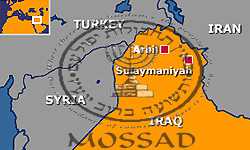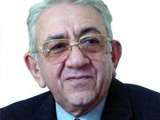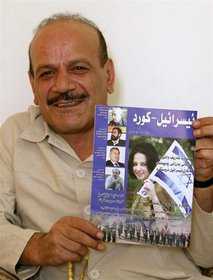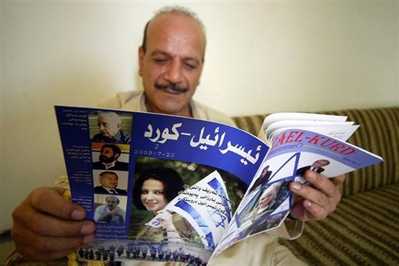 Iran’s Fars news agency claimed Tuesday that the CIA and the Mossad were actively promoting Christianity in the Kurdish region of northern Iraq.
Iran’s Fars news agency claimed Tuesday that the CIA and the Mossad were actively promoting Christianity in the Kurdish region of northern Iraq.
According to the report, the Americans and Israelis were offering $1,000 to any youngster willing to convert to Christianity.
The news agency further claimed that several Christian organizations had translated the Bible into Kurdish and were distributing them to young Kurds.
Source: www.jpost.com, Aug 4, 2009
CIA, Mossad Promoting Evangelism in Northern Iraq
 TEHRAN (FNA)- The US and Israeli spy agencies are trying to promote evangelism in Iraq’s Kurdistan region, sources said.
TEHRAN (FNA)- The US and Israeli spy agencies are trying to promote evangelism in Iraq’s Kurdistan region, sources said.
According to a series of information obtained by FNA, the Central Intelligence Agency (CIA) and Israeli Secret Services (Mossad) are striving to promote Christianity among the youth in Iraq’s northern region of Kurdistan.
According to FNA dispatches, the two intelligence agencies have also allocated heavy funds for the task and pay $1,000 to every young person who turns to Christianity.
The plot began from the very beginning of US military aggression against Iraq and occupation of the country after ousting former Iraqi dictator Saddam Hussein and even earlier, sources said.
Head of the Islamic Group in Kurdistan Ali Bapir warned about the development, saying, “The international organization for evangelism in Iraq will pay 1,000 US Dollars to those who convert to Christianity.”
Member of the Islamic Unity Movement of Kurdistan Babakr Ahmad told FNA, “Islamic parties have felt the danger. Unfortunately, the international Christian organizations are actively promoting Christianity given their available huge funds.”
Kurds who have recently embraced Christianity hold annual meetings in Arbil, the capital of the Kurdistan autonomous region.
Ali Bapir strongly criticized the authorities of Kurdistan autonomous region for their inaction in the face of the development and for issuing the required permission for holding such meetings.
According to FNA dispatches, other evangelist institutions like ADS Institution are funding translation of Bible into the Kurdish language.
An informed source from the evangelist institution in Arbil told FNA on the condition of anonymity that the main mission of the institution is distribution of Bible in Kurdish language.
The source said the manager of the institution is a British who uses an alias name, “Eskandar” (Alexander), to escape identification.
The source underlined that the institution’s books are coming from England and Greece and that the translated books are distributed among the people for free.
Source: english.farsnews.com, 2009-08-04









